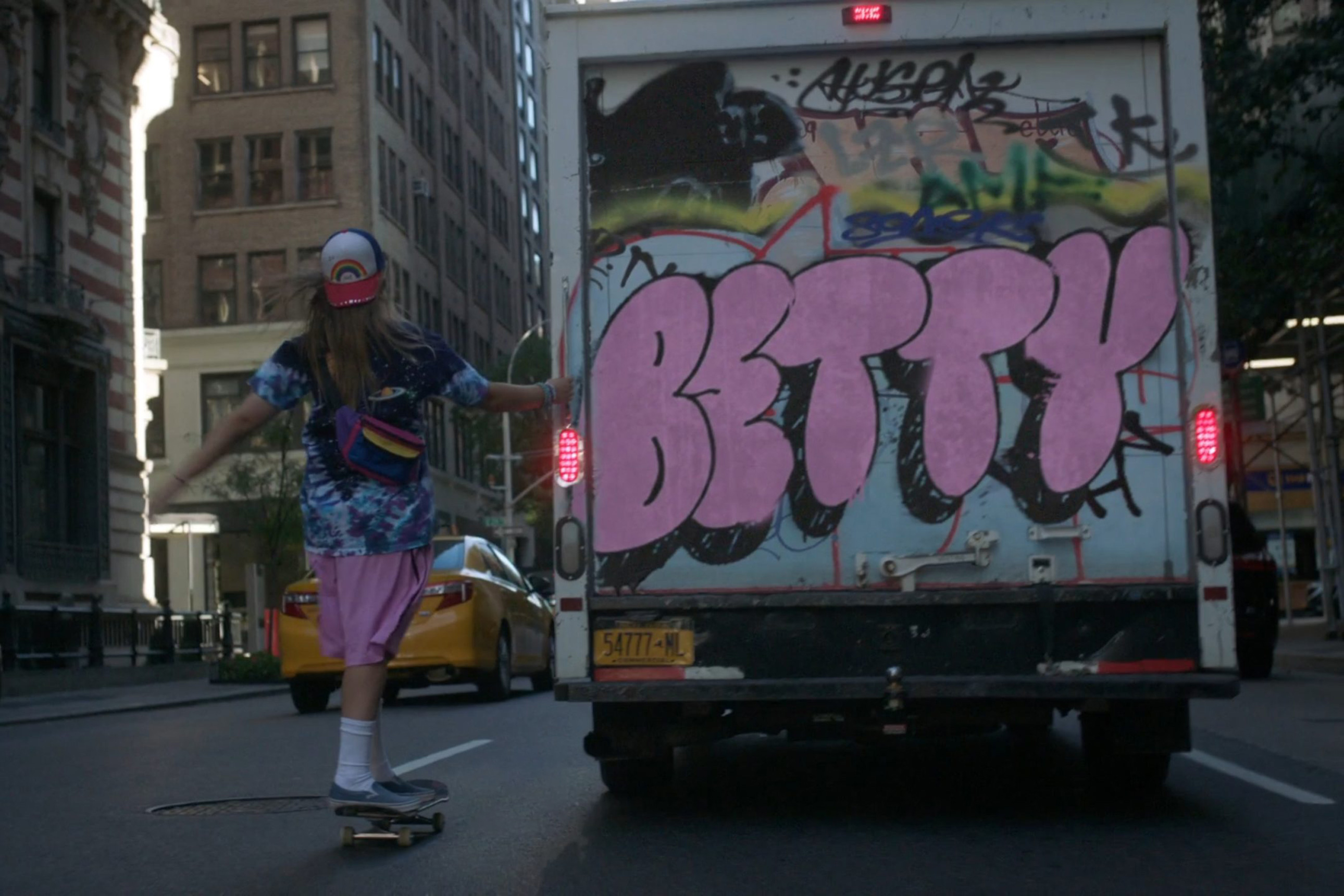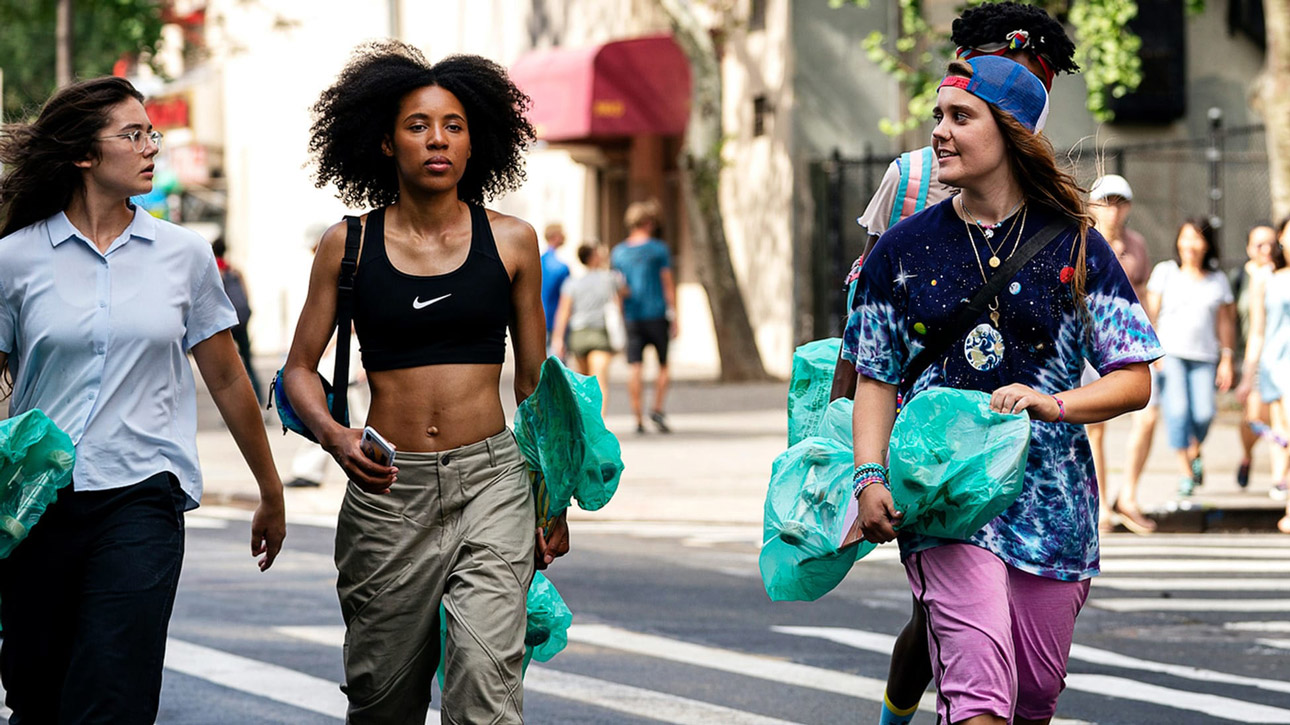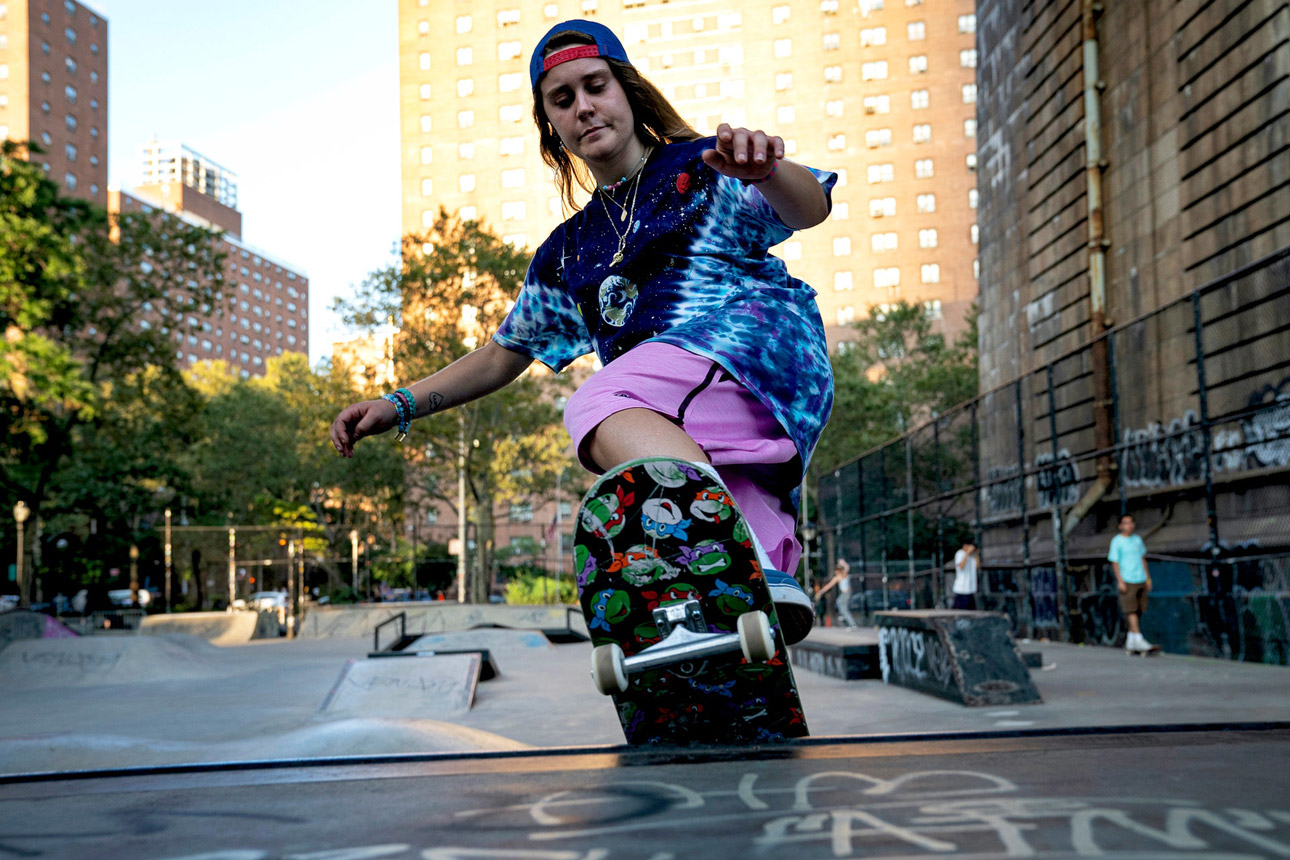An honest review of HBO’s Betty


As a photographer, Linnea Bullion has spent the past nine years documenting skateboarding from behind the lens. She also majored in film seven years ago; a degree she admits she rarely uses. Following the release of Betty, HBO’s new show about a group of female skaters in NYC, we asked Linnea to dust off the degree and share her thoughts…
While watching Betty, there were moments that I glimpsed what it could have been. Like when the character Honeybear furtively drops her skateboard out of her bedroom window before a brief but awkward interaction with her conservative father and grandmother — from just one scene, I knew more about this character than I learned in the entirety of the show’s first two episodes. Unfortunately, these moments are few and far between.
I wanted to like Betty. Representation in media is important, and the show tries to tackle issues that need to be tackled — particularly by female and non-binary voices. The problem is just that: it tries to tell everything rather than let the audience gradually discover any of it for themselves. I suspect that much of the audience watching this show already has a personal stake in skateboarding, which makes Betty’s choice to tell me things about it via clunky dialog and less-than-great acting that much more confusing. Part of the reason we constantly hear “show don’t tell” is because you need to trust that your audience is smart enough to interpret the scenes they’re given. Telling them everything is a disservice. It simultaneously demeans the audience by not allowing them to come to conclusions, and leaves them less likely to walk away with an important message because they haven’t made those discoveries on their own. This goes for both skaters and non-skaters watching. Those who skate don’t need the message hammered home, they’ll get it. And for those who don’t skate, allowing them to have a revelation would be more impactful.

Over the past few years, I’ve watched many films centered around skateboarding. There is one common thread between those that are successful and those that aren’t: the successful ones treat skateboarding as a backdrop rather than a focus. Yes, skateboarding is a culture and a “lifestyle” for millions. But at the end of the day, your characters need to tell me the message. Not via dialog, but via their deeds and emotions and interactions with one another. Let me see that they care about this thing because of the joy on their faces, and because of the connections they forge with others. Help me to understand that skateboarding has given them confidence because they physically walk taller after learning to skate; because they’re able to stand up to the problems set up at some point earlier in the plot. I think the reason Betty was so frustrating to me was because I could see all of the ways in which it went wrong. I could see the bones of a meaningful show that was lost to the clichés of “edginess” and slo-mo shots of skating. For example, the Honeybear scene I described earlier happens at the very beginning of episode two. I was caught off-guard. “This is where the show should have started” I wrote over and over in my notes. I can’t even tell you what the first scene of the pilot was without going back and rewatching it. But that intro to episode two? It was beautiful. It showed me something. Better yet, I felt something.
Interestingly, the show seems to value quantity over quality despite being largely absent of a plot or discernible character arcs. It throws heavy concepts like carving a space for oneself in a boys’ club, gentrification, and truth in the Me Too era at you as though merely bringing them up is enough exploration without actually having much to say. Media about nothing can be powerful — look at films like Lost in Translation or the mumblecore movement in general — but Betty cares less about what it has to say than hearing its own voice.
My other major disappointment in Betty was just how convoluted those messages are. We are shown the dynamic between Camille and her male skater friends cut between a group of female skaters at the park. Camille looks uneasy and uncomfortable while the group of women is laughing and having fun. So… you won’t have fun if you hang out with guys at the skatepark? Is that the takeaway? And yet, in the pilot one of the main women claims, “skateboarding isn’t about how many tricks you got,” and continues arguing until validated by a male counterpart. The show can’t make up its mind about men, and loses itself in thinking it has to have a message. Showing female friendship doesn’t have to belittle hetero platonic relationships. They can coexist. Equality isn’t about ostracizing an entire gender. Plots shouldn’t revolve around purely pitting genders against one another.

Betty tries to tackle too many issues too quickly, and would benefit from slowing down (something that may surprise some of you who watched the show and felt like nothing was happening). Let me pitch my vision of Betty to you: the pilot starts off with the Honeybear scene I described earlier. Honeybear meets the rest of the girls, and through their friendship, starts realizing that she needs to face her conservative father and express herself openly and honestly. In episode two, Kirt meets a woman, Indigo, and instantly has a crush on her. Kirt teaches her to skate, but is confused by how quickly Indigo is made uncomfortable by the locals at the park who aren’t welcoming. Kirt gets into a fight with one of the locals, upsetting Indigo. Never one to back down from a fight, Kirt has to quiet her impulses while Indigo simultaneously opens up and becomes more confident as her skating progresses. Each episode gives us more backstory and fleshes out its characters rather than relying on cool-girl tropes and music to try to get us to care. Their personalities aren’t flattened into singular words (the extrovert, the newbie, the introvert, etc), but are crafted into dynamic, compelling women. That’s the show I want to watch. That’s the show I’m disappointed I don’t get to see.
At the end of the day, I am not the demographic this show was intended for, and if you love it — great. Again, I think it’s important for content like this to be made by women, starring women. Other television shows have taken longer than two episodes to hit their stride, and maybe that’ll be the case for this one. But the difference between an ok show and an incredible one isn’t as large as you’d think. Minor changes could’ve made Betty generation-defining.
If you were to drift off into a day dream about skateboarding around NYC on a perfect summer day, it…
Di’orr Greenwood’s skateboarding story is multifaceted and powerful, from rolling with a fun loving and hard-shredding all women’s crew, to…
This past weekend, Yeah Girl contributor Linnea Bullion had a book release party and exhibition at Monster Children's 1700 Naud…